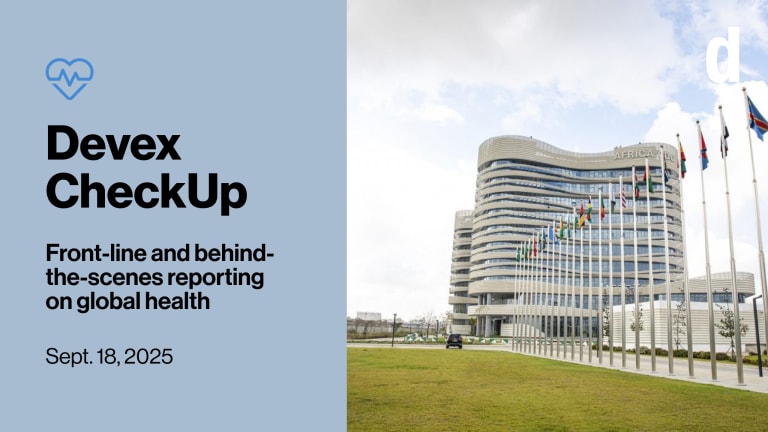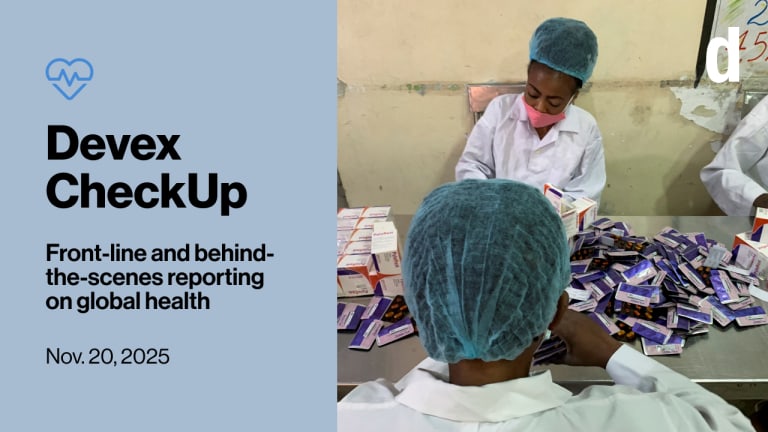
It’s been a whirlwind week at the U.S. Centers for Disease Control and Prevention.
Last Friday, the Trump administration fired over 1,300 CDC employees, only to rescind about 700 of those terminations the next day, stating it was a coding error. That still left around 600 staff members facing job losses.
But yesterday, a judge issued a temporary order halting the administration’s plan to dismiss federal employees at the CDC and other agencies during the government shutdown — in response to a lawsuit filed by several labor unions seeking an injunction to stop the layoffs.
This wasn’t the first round of firings at the CDC — and with the latest firings, nearly a quarter of its staff would be separated from the agency this year.
But even without these latest cuts, the agency’s global health work has been significantly curtailed. The agency can no longer work with the World Health Organization. The White House’s 2026 budget proposal eliminates the CDC’s Global Health Center and funding for most of its bilateral programs. CDC staff cuts in April also eliminated the entire maternal and child health team under the division in charge of global HIV work.
Dr. Barbara Marston, who retired from the CDC in 2022, tells my colleague Sara Jerving that cuts to the agency’s global health work mean the U.S. is “losing trust and relationships that have in the past positioned us well to be informed early about global health threats and assist in controlling them.”
ICYMI: Haphazard US CDC staff cuts leave questions around impact
Related reading: How US Health and Human Services budget cuts could impact global health
Communities stepping in
The U.S. funding cuts are posing serious risks for many global health programs, from vaccinations to people’s access to health care. But organizations are also finding opportunities to address problems on the ground.
Take, for example, efforts in India to reach zero-dose children — those who have not received a single immunization and are therefore vulnerable to vaccine-preventable diseases.
India, which accounts for 6.4% of the nearly 14.3 million zero-dose children globally, launched vaccination campaigns between 2023 and 2024 that helped immunize 700,000 children, mainly in rural and migrant communities.
Weak data systems and migration pose challenges to reaching every child. Those born outside of hospitals aren’t captured in medical records. Families who often migrate to other locations for work also bring their children along, leaving them to miss their vaccination shots.
But Devex contributor Cheena Kapoor finds informal kinship care arrangements — in which children of migrating families are taken in by caregivers for vaccinations — are helping improve immunization rates. One health policy expert even suggested it could be a model to address vaccine delivery challenges in other low- and middle-income countries.
Read: India’s fight to reach the children vaccine campaigns still miss
Related: How Gavi is reaching ‘zero-dose’ children in conflict areas (Pro)
+ Curious about the insights that drive global development? Experience Devex Pro with a 15-day free trial. Explore expert analyses, unlock hidden funding opportunities, connect with key players at exclusive events, and access a wealth of knowledge you won’t find anywhere else. Check out all the exclusive content available to Pro members.
Your next job?
Senior Manager, Maternal and Newborn Child Health and Nutrition
Clinton Health Access Initiative
Zimbabwe
Free is the answer?
Here’s another initiative filling health system gaps: Helpster, a health tech nonprofit, is piloting a free emergency health insurance scheme in several countries in Africa and Asia.
How does it work? Patients can go into a health facility and request help to cover their bill. If they pass the criteria — which is based on a patient’s economic means and the urgency of the medical intervention — Helpster covers up to $3,000 of the bill. It may cover more than that for life-threatening situations that require specialist doctors.
The scheme is funded by donations mainly coming from private philanthropists in the tech space. It officially launched in 2023 and has covered medical bills in Bangladesh, Cambodia, and Sri Lanka, as well as Kenya and Nigeria. Pilots are also expected in Guinea-Bissau, Rwanda, Senegal, Somalia, and Uganda.
The initiative could help ease the financial burden faced by populations in these two continents. In Africa, less than 20% of the population is covered by government and private sector health insurance.
This means that a high percentage of people go into debt or turn to public fundraising, including on WhatsApp, to cover the high cost of medical bills. Statistics from WHO show that in 2021, 4.5 billion people were not fully covered by essential health services, and that 1 billion people are experiencing catastrophic out-of-pocket health spending.
Read: How a free health insurance pilot is taking on medical debt in Africa
Calling it as it is
“The only discernible difference that you would have between the Biden administration and the Trump administration is that the Biden administration pretended to be concerned, whereas the Trump administration does not even pretend.”
— Avril Benoît, former CEO, Médecins Sans Frontières USAThat’s what Benoît, who stepped down as CEO of MSF USA at the end of September, said about the organization’s engagement with the U.S. government on the crisis in Gaza.
In an exit interview with Sara, the humanitarian and former journalist spoke with candid frankness on her organization’s internal challenges — including hiring more women — and the failures of world leaders in stopping the increasing attacks on health infrastructure globally and what a U.N. independent commission described as genocide in Gaza.
That kind of frankness is part of MSF’s DNA, something that she said donors appreciated about the organization. Doctors Without Borders USA saw a nearly 90% increase in donor support during her tenure, from less than $400 million to over $750 million.
The organization is not perfect, she admitted. It faced allegations of racism, something Benoît said they took “to heart.” But “at the same time, we’re tenacious, we’re dogged, we’re willing to take risks and do things and be in places that other organizations are maybe less risk tolerant,” she said.
Benoît said she’s taking a break to recharge after nearly two decades with MSF, dealing with wars, displacement, rape, and outbreaks. But it seems she’s already preparing to take on a whole new set of challenges, from the weaponization of information to the climate crisis.
Read: Avril Benoît on her six years at the helm of Médecins Sans Frontières USA
One big number
€1 billion
—That’s how much funding Germany is committing to the Global Fund to Fight AIDS, Tuberculosis and Malaria over the next three years.
That’s €300 million less than Germany’s previous commitment to the multilateral institution. But advocates say it sends an important signal of commitment to other donor countries, in the midst of funding cuts and uncertainties.
It’s the largest pledge the Global Fund has received to date from a single donor for its upcoming eighth replenishment. Other donors that have announced early pledges include Australia, Denmark, Luxembourg, Norway, Portugal, Spain, Switzerland, and several foundations, including the Gates Foundation, Product RED, and the Children’s Investment Fund Foundation.
Read: Germany commits €1B to Global Fund as aid cuts shape World Health Summit
Market or bust
My colleague Andrew Green was on the ground at this year’s World Health Summit, and he tells me African health leaders doubled down on their commitment to turn the continent’s vaccine manufacturing ambitions into reality. Four years after the Africa CDC set a target for 60% of the continent's vaccines to be produced locally by 2040, discussions in Berlin showed that the goal is taking shape through new financing, regulation, and partnerships.
Progress is visible on several fronts. The African Medicines Agency is being operationalized, while initiatives such as Gavi’s $1.2 billion African Vaccine Manufacturing Accelerator and the human development accelerator — a collaboration between the European Investment Bank and the Gates Foundation — are helping fill infrastructure and financing gaps. But as some pointed out, Africa’s research and development ecosystem is still constrained by dependence on imported reagents and a lack of local manufacturing inputs.
But even with growing political will, the path ahead will hinge on market demand. Experts warned that unless governments commit to buying locally made products, the new infrastructure may struggle to sustain itself once early funding runs out. As one speaker put it: “Unless the market is available, what is the point of doing the tech transfer?” Still, the mood at WHS was one of resolve — Africa, it seems, is refusing to let this agenda go.
Read: Africa inches toward local production of vaccines and more
The breast part
A group of health experts launched a new index, called Breast Cancer Care Quality Index, to help governments better diagnose, manage, and treat breast cancer, which killed some 670,000 women in 2022. One study estimates this number will increase by 68% by 2050.
The index allows governments to assess their programs on breast cancer, identify where they have gaps in diagnosis and treatment, and fill those gaps through a list of 10 targets and 23 measurable indicators. That includes, for example, ensuring that at least 60% of invasive breast cancers are diagnosed in their early stages, and that over 80% of those patients complete treatment.
But accomplishing these targets will require political will and dedicated funding. “Without leadership and sustained commitment, even the best of frameworks cannot deliver the change that women deserve,” says Toyin Saraki, founder and president of The Wellbeing Foundation Africa.
Read: New index aims to help countries close breast cancer care gaps
What we’re reading
Antibiotic-resistant infections are on the rise, with 1 in 6 laboratory-confirmed bacterial infections resistant to antibiotics in 2023, according to WHO. [The Guardian]
Psychedelic drugs are illegal in South Africa. But shamans are openly advertising their use to treat mental health conditions, even as regulatory bodies such as the European Medicines Agency say more clinical evidence is needed for their usage outside of clinical settings. [BBC]
The Maldives is the first country validated by WHO to achieve the triple elimination of mother-to-child transmission of HIV, syphilis, and hepatitis B. [Business Standard]
Search for articles
Most Read
- 1
- 2
- 3
- 4
- 5








